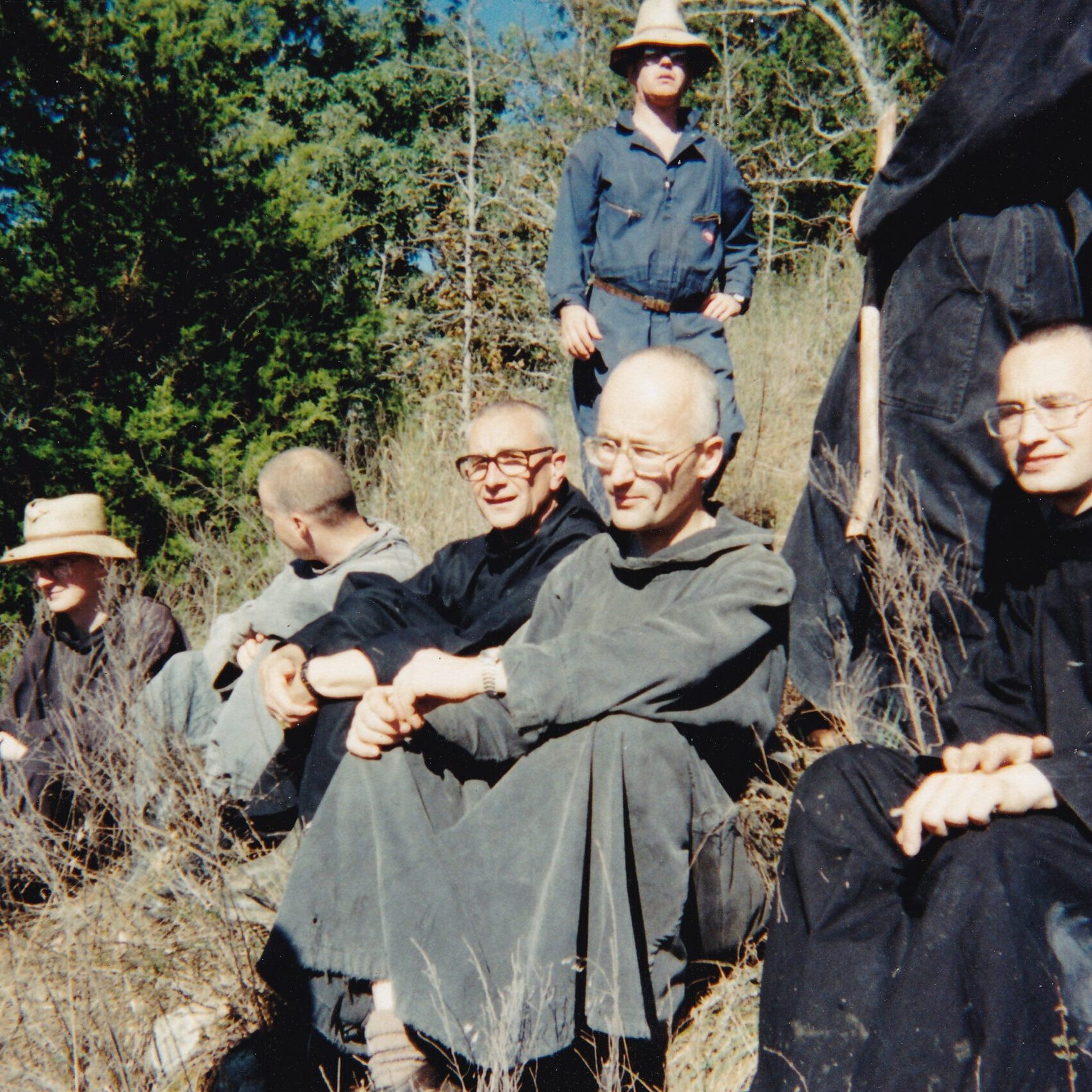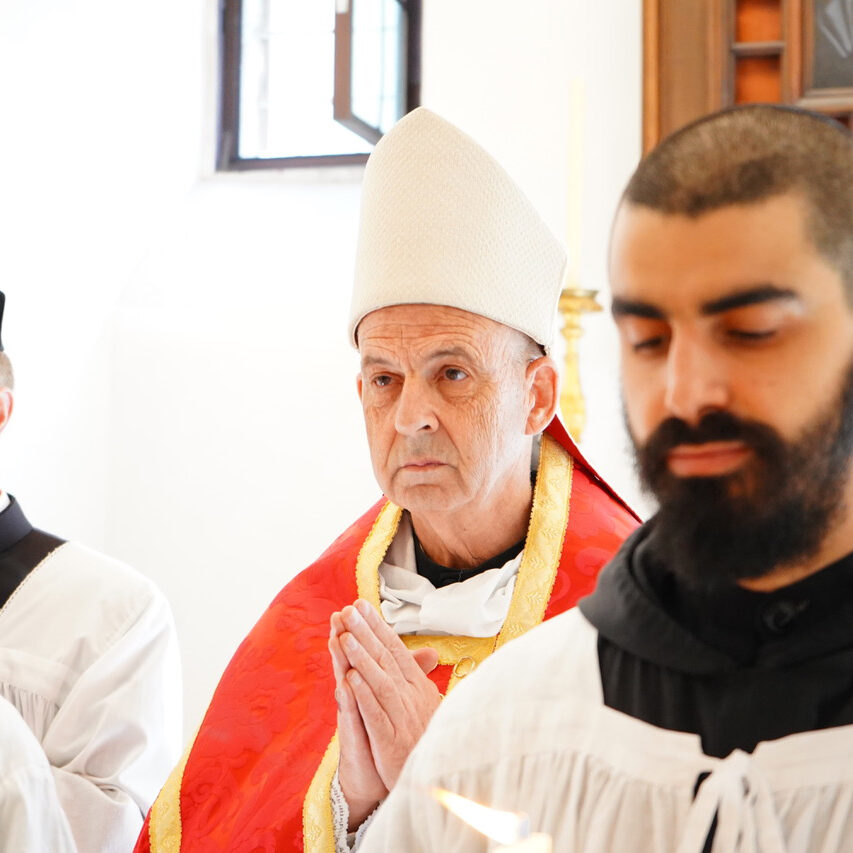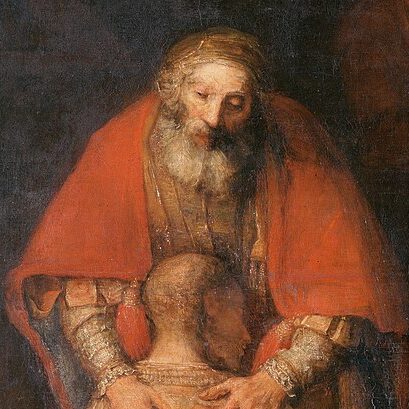Dear Friends of Clear Creek Monastery,
In the first encyclical letter of His Holiness, Pope Benedict XVI, Deus Caritas Est, of January 25th, 2006, the Church has received a precious gift, a treasure of light which we must lovingly receive into our hearts and minds. It will take more than a casual glance for any of us to sound the depths of this solemn hymn to the supreme love, which God is.
From the very outset of the encyclical (no.7), Pope Benedict establishes the vital role of contemplative life, that especially practiced by monks:
In the account of Jacob’s ladder, the Fathers of the church saw this inseparable connection between ascending and descending love, between eros which seeks God and agape which passes on the gift received, symbolized in various ways. In that biblical passage we read how the Patriarch Jacob saw in a dream…a ladder reaching up to heaven, on which the angels of God were ascending and descending. A particularly striking interpretation of this vision is presented by Pope Gregory the Great….He tells us that the good pastor must be rooted in contemplation. Only in this way will he be able to take upon himself the needs of others and make them his own….Saint Gregory speaks in this context of Saint Paul, who was borne aloft to the most exalted mysteries of God, and hence, having descended once more, he was able to become all things to all men…
One might say that the monastic life is centered on the ascending movement of charity, which unites the Church and the soul to God Himself and thus prepares the descending movement of the love of neighbor.
In the concluding part of the encyclical (no. 40), the Holy Father evokes the historical role of monks and monasteries:
Finally, let us consider the saints, who exercised charity on an exemplary way. Our thoughts turn especially to Martin of Tours, the soldier who became a monk and a bishop: he is almost like an icon, illustrating the irreplaceable value of the individual testimony to charity….Yet on the history of the Church, how many other testimonies to charity could be quoted! In particular, the entire monastic movement, from its origins with Saint Anthony the Abbot, expresses an immense service of charity towards neighbor. In this encounter “face to face” with the God who is Love, the monk senses the impelling need to transform his whole life into the service of neighbor, in addition to service of God. This explains the great emphasis on hospitality, refuge and care of the infirm in the vicinity of monasteries.
As you may well understand, these words of the Holy Father—who shows himself to have the soul of a monk if not the vocation—strike a particular resonance in our hearts. In the Rule of Saint Benedict, the whole monastic project is summed up in one short precept, handed down from the earliest Christian times: “Prefer nothing to the love of Christ.” The first encyclical letter of Pope Benedict XVI is really a long meditation on the same.
The Consequence: God’s Love Expressed In Your Gifts
The purpose of this and all our Letters to the Friends of Clear Creek is twofold. First of all, we hope to strengthen—the bonds of friendship—the bonds of charity, in fact—that join us to so many of you throughout the United States and in other parts of the world. Secondly, by these letters, we make known to you in all simplicity the material needs which press upon us and which exceed our normal means.
Like the Servant of God, Dom Prosper Guéranger, the founder of our Congregation (whose process of beatification and canonization was officially opened last December 21st), we find ourselves obliged to make these appeals, despite our desire to live mainly from the work of our hands. In fact, the beginnings of the Solesmes monastery in France were most difficult in this regard.
I take great encouragement in this from Saint Paul, who likewise had to “raise funds” in his own time, for the Christian population of Jerusalem (2 to the Corinthians, chapters 8 and 9) His remarks illuminate this difficult thing:
As long as the readiness is there, a man is acceptable with whatever he can afford….Each one should give what he has decided in his own giver. And there is no limit to the blessings which God can send you…
I have attached an extended postscript on page 4 of this letter, explaining in greater detail some recent very encouraging news that we have had in our quest to raise funds for the Monastery. I would invite you to please look this over. The final word of it all comes, again, from Saint Paul, at the end of the same chapter 9 of the Second epistle to the Corinthians: “Thanks be to God for his inexpressible gift.”
br. Philip Anderson, Prior
Dear Friends of Clear Creek Monastery,
In the first encyclical letter of His Holiness, Pope Benedict XVI, Deus Caritas Est, of January 25th, 2006, the Church has received a precious gift, a treasure of light which we must lovingly receive into our hearts and minds. It will take more than a casual glance for any of us to sound the depths of this solemn hymn to the supreme love, which God is.
From the very outset of the encyclical (no.7), Pope Benedict establishes the vital role of contemplative life, that especially practiced by monks:
In the account of Jacob’s ladder, the Fathers of the church saw this inseparable connection between ascending and descending love, between eros which seeks God and agape which passes on the gift received, symbolized in various ways. In that biblical passage we read how the Patriarch Jacob saw in a dream…a ladder reaching up to heaven, on which the angels of God were ascending and descending. A particularly striking interpretation of this vision is presented by Pope Gregory the Great….He tells us that the good pastor must be rooted in contemplation. Only in this way will he be able to take upon himself the needs of others and make them his own….Saint Gregory speaks in this context of Saint Paul, who was borne aloft to the most exalted mysteries of God, and hence, having descended once more, he was able to become all things to all men…
One might say that the monastic life is centered on the ascending movement of charity, which unites the Church and the soul to God Himself and thus prepares the descending movement of the love of neighbor.
In the concluding part of the encyclical (no. 40), the Holy Father evokes the historical role of monks and monasteries:
Finally, let us consider the saints, who exercised charity on an exemplary way. Our thoughts turn especially to Martin of Tours, the soldier who became a monk and a bishop: he is almost like an icon, illustrating the irreplaceable value of the individual testimony to charity….Yet on the history of the Church, how many other testimonies to charity could be quoted! In particular, the entire monastic movement, from its origins with Saint Anthony the Abbot, expresses an immense service of charity towards neighbor. In this encounter “face to face” with the God who is Love, the monk senses the impelling need to transform his whole life into the service of neighbor, in addition to service of God. This explains the great emphasis on hospitality, refuge and care of the infirm in the vicinity of monasteries.
As you may well understand, these words of the Holy Father—who shows himself to have the soul of a monk if not the vocation—strike a particular resonance in our hearts. In the Rule of Saint Benedict, the whole monastic project is summed up in one short precept, handed down from the earliest Christian times: “Prefer nothing to the love of Christ.” The first encyclical letter of Pope Benedict XVI is really a long meditation on the same.
The Consequence: God’s Love Expressed In Your Gifts
The purpose of this and all our Letters to the Friends of Clear Creek is twofold. First of all, we hope to strengthen—the bonds of friendship—the bonds of charity, in fact—that join us to so many of you throughout the United States and in other parts of the world. Secondly, by these letters, we make known to you in all simplicity the material needs which press upon us and which exceed our normal means.
Like the Servant of God, Dom Prosper Guéranger, the founder of our Congregation (whose process of beatification and canonization was officially opened last December 21st), we find ourselves obliged to make these appeals, despite our desire to live mainly from the work of our hands. In fact, the beginnings of the Solesmes monastery in France were most difficult in this regard.
I take great encouragement in this from Saint Paul, who likewise had to “raise funds” in his own time, for the Christian population of Jerusalem (2 to the Corinthians, chapters 8 and 9) His remarks illuminate this difficult thing:
As long as the readiness is there, a man is acceptable with whatever he can afford….Each one should give what he has decided in his own giver. And there is no limit to the blessings which God can send you…
I have attached an extended postscript on page 4 of this letter, explaining in greater detail some recent very encouraging news that we have had in our quest to raise funds for the Monastery. I would invite you to please look this over. The final word of it all comes, again, from Saint Paul, at the end of the same chapter 9 of the Second epistle to the Corinthians: “Thanks be to God for his inexpressible gift.”
br. Philip Anderson, Prior






